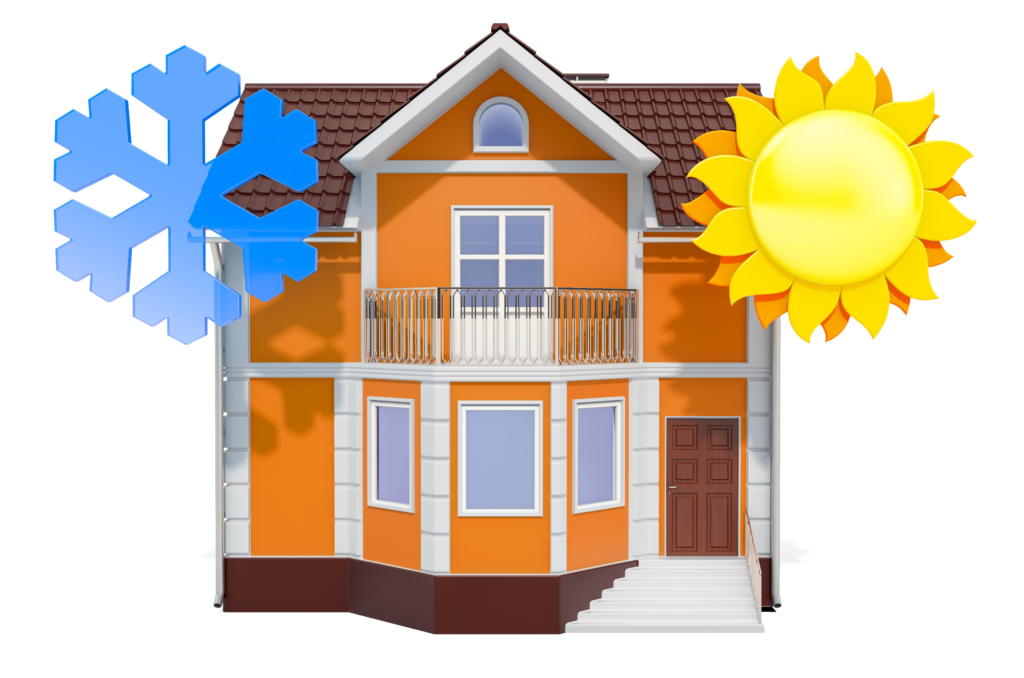Tips to prevent indoor heat stress
In view of increasingly hot summers, living spaces need to be protected from excessive temperatures. Our expert will tell you what measures you can take to avoid overheating and thus do something for your health.
Tip 1: Analyze the current status and identify weak points
When planning a new building, it makes sense to consider a roof overhang. In summer, when the sun is high in the sky, the overhang helps to keep the heat outside. In winter, the low sun can generate solar heat gains. Balconies can have a similar effect. In the case of existing buildings, the issue of heat protection can be tackled via thermal insulation. Homeowners should ask themselves whether the roof and the facade are sufficiently insulated. How old are the windows and doors? Are there folding shutters, roller shutters or blinds to provide enough shading?
Tip 2: Choose the right measures
A well-insulated building envelope helps prevent the building interior from heating up too much in summer. Insulating the facade, the roof or at least the top floor ceiling has a positive effect on the indoor climate. Since the building envelope can only be as good as its weakest link, it is crucial that windows and doors are also well insulated. Glass surfaces should be protected from too much sunlight by roller shutters, folding shutters, Venetian blinds or awnings. This is particularly important for roof windows. Please note that externally installed sun protection is most effective. These days, shading devices can be conveniently lowered and raised with the help of drives and automatic timers. Modern solar drives also help to save electricity.
Tip 3: Ensure good ventilation
Proper ventilation contributes significantly to a good room climate. If you open windows and doors manually, you should do this in the early hours of the morning on hot days, preferably before sunrise, when temperatures are at their lowest. But ventilation can also be provided by controlled ventilation systems, which automatically exchange the room air. Decentralized ventilation systems are ideal for refurbishment projects, whereas centralized systems are usually installed in new-builds.
Tip 4: Only use low-emission products
Whether new-build or old building: When upgrading the energy efficiency of a building, especially when providing for heat protection in summer, a large variety of materials are used, including thermal insulation materials, vapor barriers, joint sealants, sealing tapes and many more. In the course of refurbishment projects, also wall and floor coverings are often replaced. These projects involve, among others, the use of parquet and tile adhesives, grouts, plasters and paints. Many of these building materials have a direct impact on the indoor climate and thus on the residents’ health. No matter what the product group: When selecting the required materials, consumers should pay special attention to products that are harmless to human health in order to avoid the emission of pollutants into indoor air. They should also address this point in good time to the craftsmen hired to do the job.
A certificate that consumers can rely on is the EMICODE® EC1 seal on the product packaging. The organization behind this seal is the GEV, the “Association for the Control of Emissions in Products for Flooring Installation, Adhesives and Building Materials”. Products that have been awarded the EMICODE® label were tested for harmful VOC emissions by independent laboratories in special test chambers. To ensure long-term compliance with the predefined limit values, the initial test is followed by regular spot checks carried out by neutral experts and testing institutes without prior notification.
Tip 5: Better do without fans and air-conditioners
If possible, avoid fans or air-conditioning systems. Although these appliances provide a certain cooling effect, they can also have side-effects and often cause colds and muscle tension. Moreover, they consume a lot of electricity.
Tip 6: Better do without fans and air-conditioners
Do not invest too little in summer heat protection. Measures that are taken to prevent overheating in summer quickly pay off, because they also have a positive effect in winter. They protect your home from the cold, reduce heat loss and lower the consumption of heating energy. This not only saves a lot of money but also benefits the environment.

Photo: © alexlmx/123rf.com/GEV
Do You Have Questions?
If you have any questions on certain topics or want to contact us for another reason, please contact us by phone, fax or email.
Phone: +49 211 / 67931-20
Fax: +49 211 / 67931-33
info@emicode.com
Share article on Social Media: